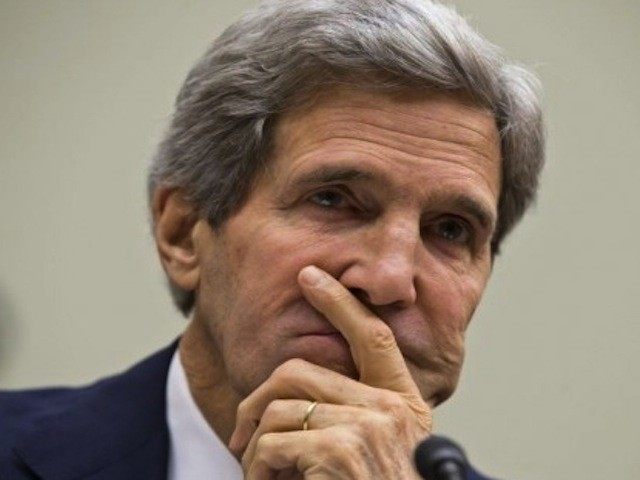The U.S. State Department’s recent rejection of an Iraqi nun’s request for a visa has ignited a firestorm, with conservatives calling for an official congressional probe into the decision.
Nina Shea, director of Hudson Institute’s Center for Religious Freedom, broke the news last Thursday that a persecuted Iraqi Catholic nun named Sister Diana Momeka, “an internationally respected and leading representative of the Nineveh Christians who have been killed and deported by ISIS,” was prevented by the US State Department from coming to Washington to testify before Congress concerning the sufferings of Christians under Islamic State militants.
An Iraqi delegation of minority groups—comprising representatives of the Yazidi and Turkmen Shia religious communities as well as a Christian nun—requested visas to come for official meetings in Washington. Every one of the delegation received a visa except the lone Christian.
Former House Speaker Newt Gingrich declared that “Congress has to investigate and find out who made this decision and what is the State Department going to do about it.”
“This is an administration which never seems to find a good enough excuse to help Christians, but always finds an excuse to apologize for terrorists,” Gingrich said. “I hope that as it gets attention that Secretary of State John Kerry will reverse it. If he does not, Congress has to investigate, and the person who made this decision ought to be fired.”
Conservative commentator Glenn Beck said he couldn’t believe that Sister Momeka was denied a visa to enter the United States.
“Remember, we’re just letting people come in across the border,” Beck said on his television program. “She has a reason to come into the country; we don’t let [her] in.”
The State Department’s decision coincided with the release of the annual report of the U.S. Commission on International Religious Freedom (USCIRF), which underscored the Administration’s softness in dealing with the persecution of Christians.
Remarkably, the State Department’s most recent list of “Countries of Particular Concern” (CPCs) “where particularly severe violations of religious freedom are perpetrated or tolerated” does not include some of the countries of greatest persecution of Christians in the world today, namely: Iraq, Syria, Pakistan and Nigeria.
After Shea’s article appeared, she and her employer were contacted by a representative of the State’s Bureau of Consular Affairs who tried to get Shea to revise her article, which she refused to do.
Sister Diana is a member of the Dominican Sisters of Saint Catherine of Siena, a Catholic order of nuns that traces its presence in Iraq back to the 13th century.
The nun is uniquely qualified to testify to Islamic State atrocities in Iraq. When Mosul was overrun by Islamic extremists in June 2014, some 500,000 civilians left the city en masse, in an effort to escape the siege. At that time, the only group that chose to remain in Mosul were the Dominican Sisters of St. Catherine of Siena, “a congregation of Iraqi sisters that has witnessed generation upon generation of war and carnage.”
Sister Diana had set up meetings with the Senate and House foreign-relations committees, the State Department, USAID, and several NGOs, to testify to the atrocities perpetrated against Christians by the Islamic State.
On April 28, however, the U.S. consulate in Erbil told Sr. Diana that her visa application had been denied, stating that she was unable “to demonstrate that your intended activities in the United States would be consistent with the classification of the visa.”
The nun told Nina Shea that consular officer Christopher Patch said she was rejected because she is an “IDP” or Internally Displaced Person. In other words, the State Department suspected that the Catholic nun could be secretly intending to stay in the United States.
According to Shea, the nun has become internationally known as a spokesperson for the over 100,000 Christians driven into Kurdistan under the ISIS “convert or die” policy. Former congressman Frank Wolf’s (R-VA) met her in Kurdistan a few months ago, and agreed to sponsor her trip to the US in order to tell her story.
Wolf said they had hoped to facilitate her trip to the States “so that she could speak with great candor, as is her custom, to policymakers.” Wolf said that he views her as “a critical voice to awaken the church in the West to the suffering of Christians and other religious minorities in Iraq.”
“We were shocked and disappointed when we found out,” said Elyse Anderson of the 21st Century Wilberforce Initiative.
“It is beyond ironic,” said Anderson, “that Sister Diana, who we had hoped would come to Washington to speak about the worsening plight of Iraq’s displaced Christians and other beleaguered religious minorities, was apparently prevented from doing so precisely because she is herself a displaced person.”
Follow Thomas D. Williams on Twitter: @tdwilliamsrome

COMMENTS
Please let us know if you're having issues with commenting.